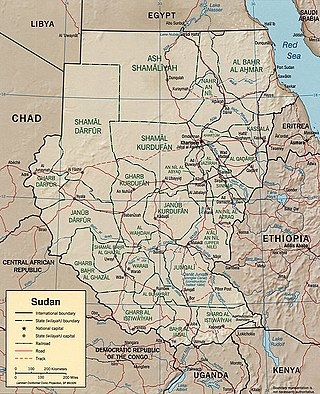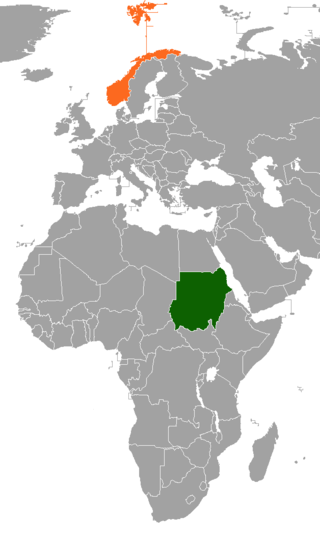Related Research Articles

The organized International Red Cross and Red Crescent Movement is a humanitarian movement with approximately 16 million volunteers, members, and staff worldwide. It was founded to protect human life and health, to ensure respect for all human beings, and to prevent and alleviate human suffering. Within it there are three distinct organisations that are legally independent from each other, but are united within the movement through common basic principles, objectives, symbols, statutes, and governing organisations.

An internally displaced person (IDP) is someone who is forced to leave their home but who remains within their country's borders. They are often referred to as refugees, although they do not fall within the legal definitions of a refugee.

Humanitarian aid is material and logistic assistance to people who need help. It is usually short-term help until the long-term help by the government and other institutions replaces it. Among the people in need are the homeless, refugees, and victims of natural disasters, wars, and famines. Humanitarian relief efforts are provided for humanitarian purposes and include natural disasters and human-made disasters. The primary objective of humanitarian aid is to save lives, alleviate suffering, and maintain human dignity. It may, therefore, be distinguished from development aid, which seeks to address the underlying socioeconomic factors which may have led to a crisis or emergency. There is a debate on linking humanitarian aid and development efforts, which was reinforced by the World Humanitarian Summit in 2016. However, the conflation is viewed critically by practitioners.

The Directorate-General for European Civil Protection and Humanitarian Aid Operations, formerly known as the European Community Humanitarian Aid Office, is the European Commission's department for overseas humanitarian aid and for civil protection. It aims to save and preserve life, prevent and alleviate human suffering and safeguard the integrity and dignity of populations affected by natural disasters and man-made crises. Since September 2019, Janez Lenarčič is serving as Commissioner for Crisis Management in the Von der Leyen Commission, and since 1 March 2023, Maciej Popowski leads the organisation as the Director-General.

Norwegian People's Aid was founded in 1939 to provide post-conflict reconstruction assistance and humanitarian relief during conflicts. NPA is now engaged in more than 33 countries in de-mining, humanitarian relief, promoting democratization; the rights of indigenous people, equality; and fair distribution of power and resources. NPA currently operates de-mineing activities in 16 countries and played a central role in the International Campaign to Ban Landmines and the Convention on Cluster Munitions which was signed in Oslo in 2008.

The United Nations Office for the Coordination of Humanitarian Affairs (OCHA) is a United Nations (UN) body established in December 1991 by the General Assembly to strengthen the international response to complex emergencies and natural disasters. It is the successor to the Office of the United Nations Disaster Relief Coordinator (UNDRO).

Operation Lifeline Sudan (OLS) was a consortium of United Nations agencies and approximately 35 non-governmental organizations operating in southern Sudan to provide humanitarian assistance throughout war-torn and drought-afflicted regions in the South. Operation Lifeline Sudan was established in April 1989 in response to a devastating war-induced famine and other humanitarian consequences of the Second Sudanese Civil War between the Sudanese government and South Sudanese rebels. It was the result of negotiations between the UN, the Government of Sudan and the Sudan People's Liberation Movement/Army (SPLM/A) to deliver humanitarian assistance to all civilians in need, regardless of their location or political affiliation. This included over 100,000 returnees from Itang in Ethiopia in 1991. Lokichogio was the primary forward operations hub for OLS.

While there is a consensus in the international community that ethnic groups have been targeted in Darfur and that crimes against humanity have therefore occurred, there has been debate in some quarters about whether genocide has taken place there. In May 2006, the International Commission of Inquiry on Darfur organized by United Nations "concluded that the Government of the Sudan has not pursued a policy of genocide ... [though] international offences such as the crimes against humanity and war crimes that have been committed in Darfur may be more serious and heinous than genocide." Eric Reeves, a researcher and frequent commentator on Darfur, has questioned the methodology of the commission's report.

Malteser International is an international non-governmental aid agency for humanitarian aid of the Sovereign Military Order of Malta. Developed in 2005 from the foreign aid service of Malteser Germany, and having the status of an independent eingetragener Verein since 2013, the agency has more than 50 years of experience in humanitarian relief. It currently implements around 100 projects in some 30 countries in Africa, Asia, Europe, Middle East and the Americas. The organization's General Secretariat is located in Cologne, Germany with regional headquarters for Europe and the Americas located in Cologne and New York City respectively. The membership of Malteser International consists of 27 national associations and priories of the Sovereign Military Order of Malta, who are responsible for supporting the organization within their jurisdictions.
The Sudanese Red Crescent (SRC) is the biggest and most decentralized and widespread humanitarian organization operating in Sudan. The society developed out of the Sudan branch of the British Red Cross Society and was established in 1956. Upon Sudan's independence in March 1956 received official recognition as an independent National Society following the Sudanese Council of Ministers decree No. 869. The National Society covers nearly the entire country with 15 State branches and several sub-branches/units in the provinces/localities and administrative units, with a nationwide community-based network of 35,000 active volunteers and another 300,000 who can be deployed as need arises. It has well-established working relations with public authorities at federal, state and local levels, and good partnership and collaboration with Movement partners and UN specialized agencies and national and international NGOs working in Sudan.
The International Commission of Inquiry on Darfur was established pursuant to United Nations Security Council Resolution 1564 (2004), adopted on 18 September 2004. The resolution, passed under Chapter VII of the United Nations Charter, urged the Secretary-General to set up an international commission to investigate human rights violations committed in Darfur. The following month, the Secretary-General appointed a five-member panel of highly regarded legal experts: chairperson Antonio Cassese, Mohammed Fayek, Hina Jilani, Dumisa Ntsebeza and Thérèse Striggner Scott.

IHH Humanitarian Relief Foundation or İHH is a conservative Turkish NGO, whose members are predominantly Conservative Turkish Muslims, active in more than 120 countries.

The International Committee of Military Medicine (ICMM) is an international and intergovernmental organization consisting of more than one hundred states. The ICMM was established in 1921, in response to concerns over the lack of care provided during World War I. It was created to strengthen cooperation between the health services of the armed forces worldwide.
Peter Dalglish is the Canadian founder of the Street Kids International charity and a convicted child sex offender. Until 2015, he was the Country Representative for UN-Habitat in Afghanistan. He is currently serving an 8 year prison term in Nepal after being convicted of raping two young boys.

Norway – Sudan relations are international relations between Norway and Sudan.

United States aid to Sudan has three key objectives: a definitive end to conflict, gross human rights abuses, and genocide in Darfur; implementation of the north–south Comprehensive Peace Agreement that results in a peaceful post-2011 Sudan, or an orderly path toward two separate and viable states at peace with each other; and ensuring that Sudan does not provide a safe haven for international terrorists. Sudan has experienced two civil wars since 1955, the second of which lasted 22 years. During this time, the U.S. was the largest provider of foreign aid to Sudan, largely focused on humanitarian aid through the U.S. Agency for International Development. Sudan is listed as the U.S. government's highest priority in Africa due to "its importance for counter-terrorism and regional stability, as well as the magnitude of human rights and humanitarian abuses" U.S. foreign aid to Sudan has begun to see some positive indicators of performance although critical reaction has said that aid to Sudan is neither strategic nor focused.
Sudanese refugees are persons originating from the country of Sudan, but seeking refuge outside the borders of their native country. In recent history, Sudan has been the stage for prolonged conflicts and civil wars, as well as environmental changes, namely desertification. These forces have resulted not only in violence and famine but also the forced migration of large numbers of the Sudanese population, both inside and outside the country's borders. Given the expansive geographic territory of Sudan, and the regional and ethnic tensions and conflicts, much of the forced migration in Sudan has been internal. Yet, these populations are not immune to similar issues that typically accompany refugeedom, including economic hardship and providing themselves and their families with sustenance and basic needs. With the creation of a South Sudanese state, questions surrounding southern Sudanese IDPs may become questions of South Sudanese refugees.

Occurring between July 2011 and mid-2012, a severe drought affected the entire East African region. Said to be "the worst in 60 years", the drought caused a severe food crisis across Somalia, Djibouti, Ethiopia and Kenya that threatened the livelihood of 9.5 million people. Many refugees from southern Somalia fled to neighboring Kenya and Ethiopia, where crowded, unsanitary conditions together with severe malnutrition led to a large number of deaths. Other countries in East Africa, including Sudan, South Sudan and parts of Uganda, were also affected by a food crisis.
Qatar Charity is a humanitarian and development non-governmental organization in the Middle East. It was founded in 1992 in response to the thousands of children who were made orphans by the Afghanistan war and while orphans still remain a priority cause in the organization's work with more than 150,000 sponsored orphans, it has now expanded its fields of action to include six humanitarian fields and seven development fields.

In the early months of 2017, parts of South Sudan experienced a famine following several years of instability in the country's food supply caused by war and drought. The famine, largely focused in the northern part of the country, affected an estimated five million people. In May 2017, the famine was officially declared to have weakened to a state of severe food insecurity.